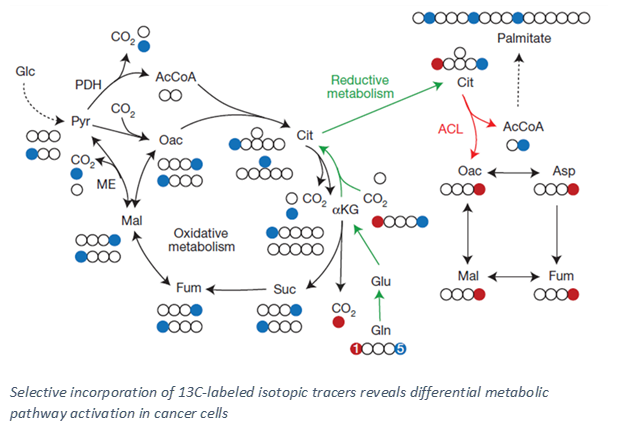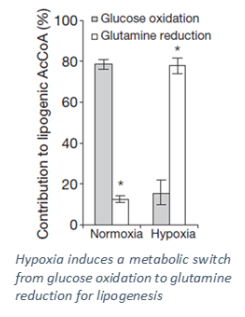In the course of oncogenic transformation, cancer cells remodel their metabolic profile to support robust proliferation and survival in the tumor microenvironment. Our lab is interested in applying the tools of stable isotope tracers and metabolic flux analysis, which we pioneered in field of biotechnology, to the study of cancer metabolism.

 In addition to considering the influence of oncogene expression and extracellular environment on metabolic flux, we also have a strong interest in understanding the dramatic metabolic rewiring of cells under hypoxia. Decreased oxygen availability occurs when blood vessels are poorly formed or distal to the site of tumor formation; this is accompanied by an increase in the fraction of glucose converted to secreted lactate rather than oxidized in the TCA cycle. Our lab’s efforts have contributed to the realization that during this process, lipogenesis, which is mostly fueled by glucose-derived carbon under normoxic conditions, exhibits a profound switch to relying on reductively-metabolized glutamine. We subsequently investigated the molecular mechanism of this process, known as reductive carboxylation, and revealed the importance of the HIF/VHL signaling axis and the citrate/α-ketoglutarate ratio in mediating its activation.
In addition to considering the influence of oncogene expression and extracellular environment on metabolic flux, we also have a strong interest in understanding the dramatic metabolic rewiring of cells under hypoxia. Decreased oxygen availability occurs when blood vessels are poorly formed or distal to the site of tumor formation; this is accompanied by an increase in the fraction of glucose converted to secreted lactate rather than oxidized in the TCA cycle. Our lab’s efforts have contributed to the realization that during this process, lipogenesis, which is mostly fueled by glucose-derived carbon under normoxic conditions, exhibits a profound switch to relying on reductively-metabolized glutamine. We subsequently investigated the molecular mechanism of this process, known as reductive carboxylation, and revealed the importance of the HIF/VHL signaling axis and the citrate/α-ketoglutarate ratio in mediating its activation.
Current projects in the lab continue to use our unique analytical toolkit to explore the metabolic consequences of cancer-associated genetic and environmental alterations.
Key publications
C.M. Metallo, P.A. Gameiro, E.L. Bell, K.R. Mattaini, J. Yuan, K. Hiller, C.M. Jewell, Z.R. Johnson, D.J. Irvine, L. Guarente, J.K. Kelleher, M.G. Vander Heiden, O. Iliopoulos, G. Stephanopoulos. “Reductive glutamine metabolism by IDH1 mediates lipogenesis under hypoxia,” Nature, 481:380-4, (2012).
P.A. Gameiro, J. Yang, A.M. Metelo, R. Pérez-Carro, R. Baker, Z. Wang, A. Arreola, W.K. Rathmell, A. Olumi, P. López-Larrubia, G. Stephanopoulos, O. Iliopoulos, “In vivo HIF-mediated reductive carboxylation is regulated by citrate levels and sensitizes VHL-deficient cells to glutamine deprivation,” Cell Metabolism, 17(3):372-85, (2013).
S.-M. Fendt, E.L. Bell, M.A. Keibler, B.E. Olenchock, J. Mayers, T.M. Wasylenko, N.I. Vokes, L. Guarente, M.G. Vander Heiden and G. Stephanopoulos, “Reductive glutamine metabolism is a function of the alpha-ketoglutarate to citrate ratio in cells,” Nature Communications, DOI: 10.1038/ncomms3236 (2013).